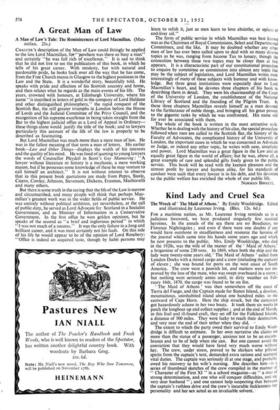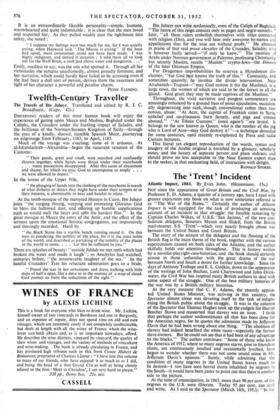Kind Lady and Cruel Sea
The Wreck of The Maid of Athens.' By Emily Wooldridge. Edited and illustrateeLby Laurence Irving. (Bles. 12s. 6d.) FOR a maritime nation, as Mr. Laurence Irving reminds us in a judicious foreword, we have produced singularly few nautical heroines. In the annals of the sea there are no Boadiceas, no Florence Nightingales ; and even if there were one doubts if any would have outshone in steadfastness and resource the heroine of the journal which came into his hands some years ago and which he now presents to the public. Mrs. Emily Wooldridge, who died in the 1920s, was the wife of the master of the ' Maid of Athens,' a brigantine of some 230 tons. In 1869, when both the ship and the lady were twenty-nine years- old, ' The Maid of Athens ' sailed from London Docks with a mixed cargo and a crew (including the captain) of eleven ; she was bound for ports on the west coast of South America. The crew were a poorish lot, and matters were not im- proved by the loss of the mate, who was swept overboard in a storm ; but nothing went seriously amiss until, in dirty weather on Feb- ruary 16th, 1870, the cargo was found to be on fire.
The Maid of Athens ' was then somewhere off the coast of Tierra del Fuego, and the Captain made for Staten Island, a desolate, mountainous, uninhabited island about one hundred miles to the eastward of Cape Horn. Here the ship struck, but the castaways got hazardously ashore in her two boats. It took them six weeks to patch the longboat up and collect supplies ; and at the end of March, in this frail and ill-found craft, they set off for the Falkland Islands, a distance of 500 miles. They were lucky to reach their destination, and very near the end of their tether when they did. • The extent to which the party owed their survival to Emily Wool- dridge is difficult to estimate. In her own narrative she claims no more than the status of a passenger, anxious 'not to be an encum- brance and to be of help when she can. But one cannot avoid the conviction that they would have fared very much worse without her. The crew, under stress, proved to be shirkers who pilfered spirits from the captain's tent, demanded extra rations and scamped vital duties. The captain was seriously ill at one stage, and probably owed his recovery to his wife's nursing. She describes him—in a series of thumbnail sketches of the crew compiled in the manner of " Character of the First XI " in a school magazine—as " a man of strong determination, and one who will conquer difficulties, and my very dear husband " ' • and one cannot help suspecting that between the captain's ruthless drive and the crew's incurable fecklessness her personality . and her sex acted as an invaluable solvent.
It is an extraordinarily likeable personality—simple, humane, warm-hearted and quite indomitable ; it is clear that the men loved and respected her. As they pulled weakly past the lighthouse into safety, she noted :
" I suppose my feelings were too much for me, for I was quietly crying, when Hayward said, ` The Missus is crying.' If the boat had upset, more commotion could not have been made. I was highly indignant, and denied it-instantly ; I told them all to look out for the Wolf Rock, a rock.just above water and dangerous...."
Emily, needless to say, was the one who spotted it. Through all her vicissitudes she remains unashamedly, almost proudly feminine, and her narrative, which could hardly have failed to be arresting even if she had been a dull sort of person, derives from the sweetness and light of her character a powerful and peculiar charm.
PETER FLEMING.



































 Previous page
Previous page